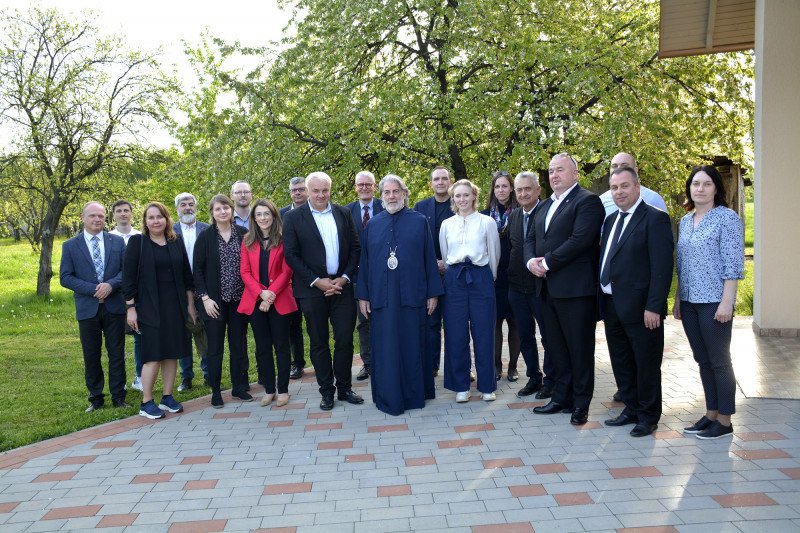On April 8th, a delegation from the Conference of European Churches (CEC) travelled to Berehove, Ukraine, to meet with leadership from the Reformed Church in Transcarpathia (RCT). The meeting was part of a broader visit with church leaders in several Ukrainian cities in a demonstration of solidarity and uplift dialogue for peace.

Photo: CEC
The Conference of European Churches (CEC) is a fellowship comprised of 114 churches from Orthodox, Protestant, and Anglican traditions from throughout Europe. The Conference originally emerged in 1959 with the intent to cultivate relations between East and West during the Cold War. A primary element of the Conference, “as a regional ecumenical organization,” is to “strengthen our common witness, act in service to Europe and the world, promote the work for the unity of the Church.”
The delegation's visit to Ukraine was in support of CEC’s Pathways to Peace initiative, a plan put forth following Russia’s 2022 invasion of Ukraine. The initiative aims to promote justice, peace, and reconciliation by “facilitating exchange among European churches, and promoting the voices of Ukrainian churches in the ecumenical debate.” Through this initiative CEC aims to concentrate on advocacy on a European political level to underscore the importance of human rights. Former CEC President Rev. Christian Krieger commented that the war in Ukraine “highlights anew the necessity of conflict prevention, peacebuilding and peace education. It also manifests the role of religion in this particular conflict and the need for churches to exercise their mediating and diplomatic skills.” The Pathways to Peace initiative is designed to expand collaboration between church leaders, academics, and intellectuals with the goal of promoting an “ecumenical vision of just peace.”
The delegation comprised the newly elected CEC leadership and was led by CEC President Archbishop Nikitas of Thyateira and Great Britain. Other present included CEC Governing Board members Dr. Charles Reed from the Church of England and Ms. Maria Mountraki from the Orthodox Church of Finland; Pathways to Peace Steering Group members Rev. Riika Porkola from the Evangelical Lutheran Church of Finland, Dr. Jonas Jørgensen from the Evangelical Lutheran Church in Denmark, and among CEC staff was General Secretary-elect Rev. Frank-Dieter Fischbach and Ms. Katerina Pekridou, CEC Programme Officer for Theology and Studies and coordinator of the Pathways to Peace initiative.
The participating leadership from the RCT included Bishop Sándor Zán-Fabián, Gábor Danku Lay President of the RCT, Béla Nagy Deputy Lay President of the RCT and Director of the Diaconal Coordination Office of the RCT, Rev. László Toth Dean of the Presbytery of Bereg, Rev. András Koloszy Dean of the Presbytery of Ung, Rev. Ferenc Taracközi, pastor of the Reformed Congregation in Berehove and responsible for communication of the RCT, and Krisztina Badó Head of the Bishop’s Office.
The meeting began with a presentation detailing the activities of the RCT, both war-related and its long-standing ministries. Following the presentation, the delegation and the leadership from the RCT sat down for an exchange. In his introduction and greetings to the RCT leadership, the CEC President praised the diversity of the delegation and, more broadly, that of CEC. He went on to emphasize that despite such diversity, we are all united under one Jesus Christ in the shared fellowship of all God’s people. The President expressed concern for and solidarity with the RCT, saying, “When one member of the body suffers, so do we all.” The president also included prayers for love, compassion, and open hearts to assist in any way possible. The delegation and leadership went on to exchange questions and discussions on the situation in Ukraine and Transcarpathia within the context of the ongoing war.
In the evening, the delegation participated in a prayer service hosted at the Reformed Congregation in Berehove before travelling to the Diaconal Coordination Office (DCO). At the DCO, there was a presentation on the office's efforts to address the community's needs, including details on the social kitchen network, the “Almond Tree” elderly home, the crisis home, and many other activities under the DCO.
On April 9th, the delegation continued its visit to churches throughout Ukraine, traveling to Lviv. There, they met with representatives of the Catholic University of Ukraine and the Institute for Ecumenical Studies before concluding their visit in Kyiv. Details on the delegation's visit to Ukraine are available on the CEC website.
Following the delegation visit to Ukraine, CEC released a joint statement alongside the Ukrainian Council of Churches and Religious Organizations (UCCRO) in which they “[condemn] the ongoing Russian aggression on Ukraine, [convey] solidarity to those impacted by the war, and [call] for just and lasting peace in the region.” The statement went on to praise churches, and international ecumenical and humanitarian organisations for their humanitarian support and dedication to supporting those affected by the conflict.